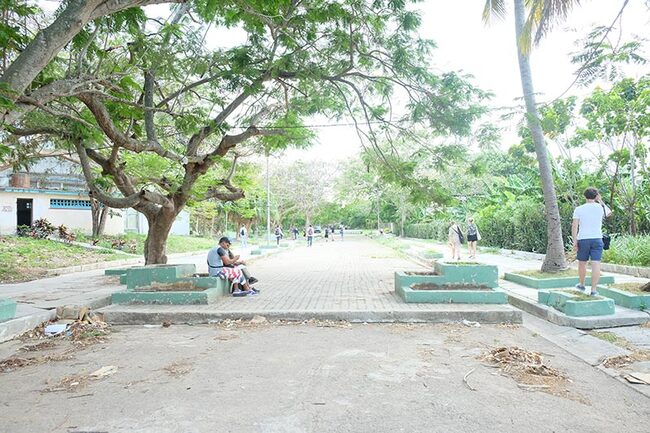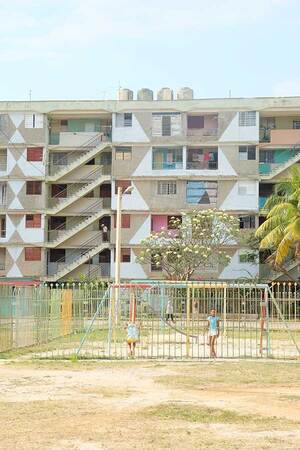
The International New Town Institute (INTI) is pleased to announce an Open Call for participation in the New Town Lab (a rapid planning workshop) in Cuba. INTI is looking for dynamic Netherlands-based designers (architects, urbanists, planners, engineers, landscape architects, placemakers) to join the New Town Lab in Alamar (Havana, Cuba) from the 11th to the 15th of September 2017.
The aim of the workshop is to find a convincing and innovative spatial concept for the future of Alamar, combining participation, food production and (drink)watermanagement. This task combines the technical and architectural issues of water collection and distribution, the design and incorporation of food production in the district, and the social question of the mobilization of residents (reforming the concept of the Micro Brigades). The purpose of the workshop is to unite all these aspects in a practical and concrete design proposal for public space.
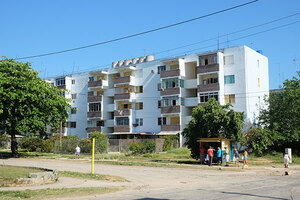
Urban challenges in Alamar
Alamar is a satellite city 10 kilometers to the east of Havana, built in the 70s by communist Micro Brigades consisting of future residents. Approximately 100,000 people live in Alamar in identical concrete flats. The flats are spacious for Cuban standards, yet Alamar is not a popular place to live. That has to do with the monotony of the cityscape and the identical flats, but also with the sparse amenities and design of public space. After the fall of the Soviet Union, when the subsidies to Cuba stopped, the cinema, swimming pool, community centers and other places of entertainment were closed. And they still are.
But there are also positive developments: the combination of boredom and unemployment and the reception of radio stations in Miami have caused the emergence of a thriving Cuban hip-hop culture, whose source is Alamar.
Next to that, the dire economic situation in the nineties has resulted in a thriving local economy in the form of organopónicos’s: urban agriculture on the scale of plantations. Alamar can provide 95% of its fresh vegetables. In the empty zones between the blocks, a major agricultural program started. With the US embargo continuing and no support from the USSR, the Cubans had to start growing their own food. An extensive and unique agricultural program was launched with the New Town Alamar as the center. It has created a unique city with a mix of apartment blocks and "organopónicos’s" that can form an inspiration for cities which are struggling with the same problems.
However, this system will become under pressure when the US embargo will be lifted. Foreign parties wanting to sell large food stocks at very low cost will be detrimental to local agriculture. Moreover, the plantations are run by (elderly) volunteers and are unpopular with the youth. This is a threat to their survival. INTI is working with its partners to demonstrate the added value of the local system and to show that it is more than just agriculture; that organopónicos also have a social and health value.
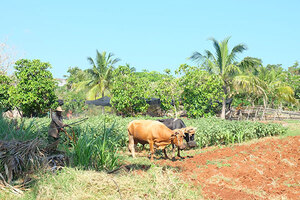
New Town Lab September 2017
This New Town Lab is part of an international program in four New Towns: Alamar (Cuba), Shenzhen (China), Curitiba (Brazil), Tatu City (Kenya). The workshops will focus on innovative approaches for the combined themes of food, water issues and participation. The participants in the workshop will use urban design (urban planning, landscape, architecture) to create an integrated strategic plan for the particular challenges which can then be implemented by the cities.
The aim of the New Town Lab in Alamar is to find a convincing and innovative concept for the future of Alamar, combining the three aforementioned topics in an integral way: participation, food production and water. This task combines the technical and architectural issues of water collection and distribution, the design and incorporation of food production in the district, and the social question of the mobilization of residents (reforming the concept of the Micro Brigades). The purpose of the workshop is to unite all these aspects in a practical and concrete design proposal for public space.
The New Town Lab in Alamar originates from some urgent problems and opportunities: firstly, the lack of drinking water in Alamar, arising from the fact that the infrastructure and the pipes of the city are based on the original (pre-revolutionary) idea of a residential area with lower density than was finally built (post-revolutionary). Thus, the houses have water supply only once every three days.
Inspiring examples in order to address this problem are the vernacular water storage systems in arid parts of southern Europe, where flat roofs collect and drain water to a storage area. Alamar has only flat roofs.
Secondly, as mentioned earlier, the organopónicos are currently successful, but their existence is also threatened in the longer term, a.o. by the lack of popularity with the youth of Alamar. Also, the residents do not recycle or separate waste, while on the other hand the organopónicos have a permanent need of green waste to make compost because of the poor soil.
Thirdly, the lack of organization and attention to public space seriously affects the quality of life in Alamar. As in many communist districts in Eastern Europe it is mainly residual areas belonging to no one and that, therefore, is not taken care of by anyone.
Fourthly, Alamar was built by Micro Brigades formed by residents who built their own homes (30,000!). The tradition to enable the local population to build all kinds of facilities (not just homes, but also community centers, schools, etc.) remained active and successful in the nineties.
Is it possible to improve the water system and the quality of public space in Alamar radically by using the methods of the Micro Brigades? An integral design of public space that takes the above issues and opportunities as a starting point, will lead to a proposal for circular processes of (green) wastewater collection and food production. The implementation of this could have enormous consequences for the quality of life, hygiene and health, and civic pride in Alamar.
Workshop
The five-day Lab brings together Dutch experts on water management, circular economy and spatial design, with Cuban professionals and residents to work together developing these topics in realistic strategies that can be implemented in Alamar. These should be simple and inexpensive so they may have an exemplary effect in similar international situations. The results are presented to stakeholders, which are chosen in such a way that implementation can be ensured in the longer term.
During the intensive, hands-on New Town Lab the team will gather local knowledge from presentations of local initiatives, field visits and local research data accompanied with in-depth lectures. With brainstorm sessions and round table discussions we will formulate alternative strategies to move forward. The team will come up with a spatial strategy in the form of a design and/or programs in public space. Outputs like maps, sketches, schemes and timelines will be collected in a replicable framework.
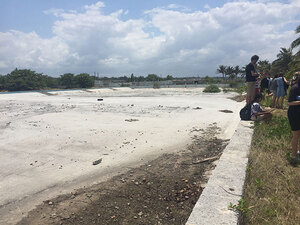
How to participate
In order to participate, please submit a proposal including the following information:
– Short CV of the applying designer/architect/planner (individual or firm)
– A rationale for why the applicant would like to take part in the project in the context of the brief provided above
– Two relevant portfolio projects
The proposal must be submitted in A4 PDF format with a maximum of 4 pages and a maximum file size of 5MB and be sent to the New Town Lab Alamar Project Assistant: Mar Muñoz Aparici - info@newtowninstitute.org
A selection committee made up of representatives from INTI and Cuban partners will review the proposals.
Please note that travel grants and accommodation costs are available to help cover the travel expenses of selected participants.
>> Deadline: April 31st <<
Applicants will be informed by May 15th 2017.
Contact information
Mar Muñoz Aparici
info@newtowninstitute.org

Made possible by our INTImi and creative industries fund NL

